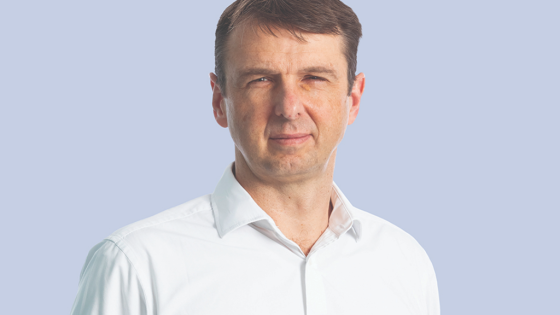[ad_1]
Alex Vaughan has navigated significant transformations since becoming Costain’s CEO five years ago
When Alex Vaughan first walked through Costain’s doors 34 years ago as a trainee quantity surveyor, he had no idea he would eventually be leading the organisation. “It’s been a series of adventures,” he recalls while visiting Construction News’ Fleet Street office one sunny morning. “When I joined the business, I had absolutely no ambition or thought that I would become a senior leader, let alone the chief executive of the organisation. There’s always been a new challenge, a new opportunity. That’s what has kept me here for so long.”
Vaughan isn’t even the longest-serving employee at Costain, a £1.3bn-turnover firm ranked 16th in the 2024 CN100 table. “We have people with 50 years’ [service] with the business. Every single month, I sign a letter to everyone who’s done five years, 10 years, 15 years, and so on in five-year increments. That pack of letters that I sign is about an inch thick.”
“There’s always been a new challenge, a new opportunity. That’s what has kept me here so long”
Alex Vaughan, Costain
Costain focuses on the transport, water, energy and defence sectors. “We’ve chosen to focus on markets that are non-discretionary,” he explains. “These are areas where investment has to happen, not just because they’re profitable, but because they are essential to the country’s economic growth and environmental resilience.”
Long-term partnerships
Since he succeeded Andrew Wyllie as chief executive in May 2019, Vaughan has moved Costain towards long-term partnerships rather than one-off contracts. He believes that the future of the construction industry lies in these enduring relationships, where companies and clients can work collaboratively over time to deliver better results.
Vaughan believes that long-term frameworks allow contractors and clients to refine their processes. “The longer we work with a client, the better we get,” he says. “By the time you’ve finished a one-off project, you’ve just learned how the client operates. But with long-term partnerships, we continuously improve.”
Not that collaboration is simple. Vaughan admits it can be tough, “because you must put your vested interests to the side to achieve a shared goal. So it certainly must never be seen as soft and cuddly and easy. It’s far from that – it’s challenging. But all parties are jointly focused on trying to achieve a goal rather than maximising their individual positions.”
Building resilience
Leading a company through the Covid pandemic and subsequent economic disruptions was a test of Vaughan’s mettle. “The pandemic brought the industry closer together,” he explains. “We shared best practices, collaborated more, and supported each other in navigating the complexities of Covid. We’re now stronger and more united as an industry than ever before.”
One persistent challenge is the shortage of skilled labour. Vaughan – an alumnus of Harvard Business School – has been vocal about the need for long-term solutions to bridge the skills gap.
Costain has partnered with academic institutions to create bespoke degree programmes designed to produce the skilled workers needed for projects like HS2 and key water infrastructure upgrades. “The industry is facing a significant shortage of skilled workers,” Vaughan says. “We need to invest in training and development, but that requires stability. That’s why having a long-term plan is so crucial.”
Innovation
Beyond solving immediate challenges, Vaughan is keenly aware that the future of the construction industry lies in innovation.
Here he draws a contrast with his early days. “When I started, we didn’t have computers on site. I had to book a terminal at one of the regional offices, drive there and sit there in an allotted time slot.”
Technology, he believes, will be a game changer for how infrastructure is designed, built, and maintained. “We’re delivering projects 60 per cent faster than traditional methods on HS2, thanks to modern techniques like telematics and modular construction,” Vaughan says. These advancements not only speed up timelines but also help with the labour shortage, he adds.
Sustainability is another key area. The company has committed to being a net-zero business and is working with clients to reduce carbon emissions across all projects. “On HS2 we’re running diesel-free sites,” Vaughan says. “And in the water sector, we’ve helped clients cut their carbon emissions by over 70 per cent while still improving efficiency.”
He is excited by Costain’s involvement in a carbon capture initiative in Teesside, in partnership with BP. In August, the firm won a multimillion-pound contract from BP for front-end engineering of a new 31 kilometre-long onshore hydrogen pipeline on Teesside. This project is aimed at reducing the carbon footprint of one of the UK’s largest industrial hubs. “It’s about much more than just reducing emissions,” Vaughan explains. “It’s about regenerating Teesside, creating jobs, and turning it into a green industrial hub for the UK.”
Long-term planning
For Vaughan, one of the biggest frustrations in the construction industry is the lack of a long-term government strategy.
“We need a 10-year plan that we can believe in,” he asserts. “We can’t keep chopping and changing. It’s disruptive, costly, and damages trust.”
Vaughan told CN in March: “If I had one wish for the next government, it would be to appoint a minister for infrastructure at cabinet level.” This wish remains unfulfilled after Labour’s victory in the general election but Vaughan is optimistic about the future of the industry. With the right leadership, investment and focus on sustainability and technology, he believes the sector can thrive and play a critical role in the UK’s economic recovery.
A career at Costain
May 2019-present: Chief executive officer
Oct 2013-May 2019: Managing director, natural resources
Jun 2010-Oct 2013: Corporate development director
Jun 2008-Jun 2010: Managing director, Community division
Feb 2006-Jun 2008: Group HR director
Feb 2006: Joins executive board
Nov 2003-Feb 2006: Africa regional director
Feb 2001-Nov 2003: PFI project manager (health sector)
July 1997-Jan 2001: Country director, Botswana and Tanzania
July 1992-July 1997: Commercial manager, UK civil engineering projects
July 1990: Trainee quantity surveyor
[ad_2]
Source link

